初中英语美文欣赏
The Big Beauty of a Little Country 小国家的大美丽
Further north lies another pint-sized country that’s 1)tucked away, not on a hill, but in the mighty Alps.
Two centuries ago there were dozens of independent states in German-speaking
Europe. Today there are only four: Germany, Austria, Switzerland and Liechtenstein. Nestled between Switzerland and Austria, the Principality of Liechtenstein is
defined by the mighty Alps to the east, the baby Rhine River to the west, and a stout fortress protecting the mouth of its valley to the south. This quirky remnant of
medieval feudal politics is just about 62 square miles. It’s truly land-locked, without a seaport or even an airport.
Liechtensteiners, who number about 35,000, speak German, are mostly Catholic and have a stubborn independent 2)streak.
Women weren’t given the vote until 1984.
The country’s made up of 11 villages. The village of Triesenberg, high above the valley, gathers around its onion-domed church, which recalls the settlers who arrived here centuries ago from the western part of Switzerland.
The town of Vaduz sits on the valley floor. While it has only 5,000 people, it’s the country’s capital. Its 3)pedestrianized main drag is lined with modern art and hotels bordering a district of 4)slick office parks.
Historically, Europe’s tiny countries have offered businesses special tax and
accounting incentives. For a place with such a small population, Liechtenstein has a lot of businesses. Many European companies locate here to take advantage of its low taxes.
And that’s how the Prince of Liechtenstein, whose castle is 5)perched above his 6)domain, likes it. The billionaire prince, who looks down on his 6- by 12-mile country, 7)wields more real political power in his 8)realm than any other European royalty.
The National Museum tells the story of the Prince and his country. Their family 9)crest dates to the Middle Ages, when the Liechtenstein family was close friends with the Hapsburg family, who ruled the 10)Holy Roman Empire. The Liechtenstein family purchased this piece of real estate from the Holy Roman Emperor. In 1719, the domain was granted principality status, answering only to the emperor. The Liechtenstein princes, who lived near Vienna, saw their new country merely as a status symbol and didn’t even bother to visit for decades. In fact, it wasn’t until the 20th century that the first Liechtenstein prince actually lived here.
In 1806, during the Napoleonic age, Liechtenstein’s obligations to the Hapsburg emperor disappeared, and the country was granted true independence. Later, after World War Ⅰ, tough times forced the principality to enter into an economic union with Switzerland.
To this day Liechtenstein enjoys a close working relationship with its Swiss
neighbours, and, like Switzerland, a big part of its modern economy is tourism and sports, hosting visitors enjoying its dramatic natural beauty. 11)Ski lifts, busy both
winter and summer, take nature-lovers to the dizzying 12)ridge that serves as the border with Austria. Even in little, little Liechtenstein the views are big and the hiking possibilities go on and on.
再往北坐落着另一个迷你小国,它不是藏在一座小山上,而是隐匿在雄壮的阿尔卑斯山间。
两个世纪以前,欧洲有许多的独立国家都讲德语。可现在只剩四个:德国、奥地利、瑞士和列支敦士登。
坐落在瑞士和奥地利之间,列支敦士登公国东有阿尔卑斯山,西临莱茵河的一小部分,南边还有一座坚固的堡垒保护着列支敦士登所处峡谷的咽喉地带。这个中世纪封建制度遗留下来的诡异的小国,面积只有62平方英里。列支敦士登也是真正意义上的内陆国家,没有海港,甚至连个飞机场都没有。
列支敦士登有人口三万五千,都说德语,大多数是天主教徒,有着相当顽固的独立主义思想。
直到19xx年,女性才拥有选举权。
整个国家由十一个村组成。特里森贝格村位于峡谷高处,村子的中心是一座洋葱形圆顶教堂,这让几世纪前来到这里的的开拓者仿佛看到了瑞典西部的影子。 瓦杜兹镇坐落在山谷的底部。虽然镇上只有5000人口,但这里是列支敦士登的首都。小镇主要的步行街两边陈列着现代艺术雕像,并分布着旅店,与窗明几净的商务办公区相邻。
由于一些历史原因,欧洲的小国家们为企业提供税收和贸易结算的优惠政策。对于一个人口这么少的国家而言,列支敦士登的贸易往来已经很多了。很多欧洲公司总部都设在这儿,为的就是享受它的低税收政策。
这也是列支敦士登王子喜欢的方式,他的城堡高踞于他的领地上。这个已然是亿万富翁的王子,俯瞰着他长六英里,宽十二英里的国家,他在自己的王国挥
洒着比其他欧洲贵族更多的政治实权。
国立博物馆讲述了王子和他的国家的故事。他们的家族徽章可以追溯到中世纪,当时列支敦士登家族与统治神圣罗马帝国的哈布斯堡家族是很亲密的朋友。列支敦士登家族从神圣罗马帝国皇帝手上买下了这块地产。1719年,这块领土被正式册封为公国,只受罗马皇帝管辖。而住在维也纳附近的列支敦士登的王子们,只不过把自己的新国家当成地位的象征,几十年都懒得去探访一次。实际上,直到20世纪,才有第一位列支敦士登王子真正居住在这里。
1806年,在拿破仑统治期间,哈布斯堡王朝对于列支敦士登的统治结束了,而这个国家也获得了真正意义上的独立。再之后,经历了第一次世界大战,困难的境况迫使列支敦士登公国与瑞士形成了经济共同体。
直到今天,列支敦士登还是和自己那些瑞士邻居们有着亲密友好的合作关系。和瑞士一样,旅游和各种运动是列支敦士登的一大部分现代经济来源,它们能让游客们沉浸在那美丽的大自然风景中。空中缆车在冬夏都很流行,可以把大自然爱好者带到那些令人晕眩的的山脊上,那里正好是与奥地利交界处。就算是在很小很小的列支敦士登,风景一样很壮观,而去徒步旅行可供选择的地方也越来越多。
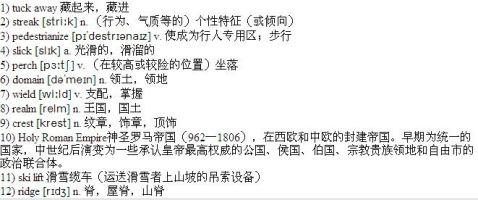
The Secret to Success: Fail a Little
成功秘诀:需要一点儿失败
I want this new school year to be a good one for my students as they learn about everything from calculus to Shakespeare to failure.
That’s right. Failure.
We all need to fail a little. In fact, the secret of success might just be that. Consider the path of Henry David Thoreau.
By many accounts, Thoreau was a failure. Folks thought he should have been a civic leader. He could have been a doctor, a lawyer, a teacher. He might even have made congressman or governor.
Instead, the Harvard man seemed to spend most of his time 1)loafing in the woods near his hometown over near Walden Pond. Everyone just scratched their heads and wondered why such a promising young fellow wasn’t a “success.”
I’m not suggesting that my students drop classes for the woods, but it’s important to remember that ideas on success vary, even in these 2)enlightened times.
The lessons of failure are an important part of the 3)curriculum of success. We learn from them. They push us to do better; they teach us humility.
As a teacher, I expect students to revise their work, to build on the “failure” of the first draft to achieve clarity and insight in the final draft. That’s a good model for most things in life.
Part of the problem, though, is that we live in a country obsessed by results. In school it is the A student who gets all the perks even though getting an A doesn’t always measure how much a person really knows. A’s are icons of honor. F’s are badges of defeat.
We idealize icons and look up to heroes such as George Washington or 4)John
Glenn. Yet we shouldn’t discount the heroes who labor outside the limelight. Those
are the men and women who quietly go about the business of raising a family and taking care of their neighbors.
The most admirable are ones who invent their own success. They know how to seize the moment and let the chips fall where they may. They know that the best way to measure success is by living each day to the fullest.
True success is giving something back. And you don’t have to have a lot in the wallet to attain it. There are many people, young and old, who give back by serving in literacy campaigns and soup kitchens.
As my father used to say: “Make sure you leave the world a better place than it was when you entered it. At least clean up after yourself.”
The beginning of the school year is a good time to start reorienting ourselves. It’s a good time to see our failures in a new light.
After Thoreau died in 1862, his mentor, Ralph Waldo Emerson, 5)lamented that Henry hadn’t blossomed into a great leader of the nation. His books were little read, his ideas seemed 5)skewed. And yet, less than 100 years later, Dr. Martin Luther King Jr. pointed to Thoreau’s essay Civil Disobedience as one of the sparks that ignited the civil rights movement and profoundly shaped American society. Not a bad legacy for a failure.
我希望这个新学年成为对学生有益的一个学年。他们将在新学年里学习很多东西,包括微积分、莎士比亚和失败。
没错,就是失败。
我们都需要有点儿失败的经历。事实上,成功的秘诀也许就在于此。以亨利?大卫?梭罗的人生道路为例吧。
根据多种流传的说法,梭罗的一生是失败的。人们认为他本该成为一名官员,他本来还可以成为医生、律师或教师,他甚至还可能当选众议员或州长。 然而,这位哈佛毕业生似乎把自己的大部分时间都用来在家乡附近瓦尔登湖畔的树林里闲逛。所有人都百思不得其解,不为什么这样一个前途光明的年轻人却没能“成功。”
我并不是建议我的学生逃课去树林里,但重要的是记住,即便是在现在这样开明的时代,对成功的定义也是不同的。
失败的教训是成功这门必修课的重要组成部分。我们从中学到了东西。它促使我们做得更好,让我们学会谦逊。
作为老师,我希望学生修改自己的作业,在初稿的“失败”基础上,让终稿做到清晰透彻。对人生中的大多数事情而言,这都是一种好模式。
然而一部分问题在于,我们生活在一个追求结果的国度里。在学校里,优等生能够得到一切特殊待遇,虽然学习成绩优异并不总能说明一个人真正的学识。现实是优异的学业成绩是荣誉的象征,而学业不及格则是失败的标志。
我们习惯于把偶像理想化,推崇像乔治?华盛顿或约翰?格伦这样的英雄。但我们不应该小看在聚光灯外苦干的众多英雄,他们就是那些默默地承担起赡养家庭和帮助邻居重任的男男女女。
最值得钦佩的人是那些开创自身成功模式的人。他们知道如何抓住时机,不计较结果。他们知道衡量成功的最佳方式是充分把握每一天。
真正的成功是予以回馈。你无须钱包厚实就能做到这一点。有很多人——有年轻的也有年长的——通过参加扫盲和救济活动作出了回馈。
正如我父亲曾经说过的一句话:“要确保你留下的世界比你来到时更美好。至少要把你自己留下的东西清理干净。”
开学是着手为自己重新确定方向的一个大好时机,也是从新的角度来看待失败的一个大好时机。
1862年梭罗去世后,他的导师拉尔夫?沃尔多?爱默生哀叹亨利没能成为我国的一位杰出的领袖。他的书无人问津,他的思想似乎离经叛道。然而过了不到一百年,马丁?路德?金说,梭罗的文章《论公民的不服从》是点燃美国民权运动
的火种之一,并对美国社会产生了深刻影响。
对一个失败者来说,这可是笔不错的精神财富。

Time Passes Venice 时光流过威尼斯
By Julian Davison
No other city in the world stirs the imagination quite like Venice. For over six centuries, this tiny republic set down in a muddy 1)lagoon at the head of the Adriatic Sea, was a global super power. Comprising some 100 low lying islands linked together by a 2)labyrinthine network of canals, Venice stands today untouched by time like some magical kingdom on the water.
The origins of Venice go back to the breakup of the Roman Empire in the fifth and sixth centuries AD. Hoping to escape successive waves of hostile 3)barbarian invaders sweeping down from the north, villages and townspeople from the mainland sought refuge on the islands of the Venetian Lagoon. The move to the lagoon was 4)fortuitous, and in time, the settlement began to grow in size and stature. With no 5)hinterland and surrounded on all sides by water, there was very little that these early Venetians could do but to take to the sea. By the ninth century, Venetian merchant adventures had established themselves as major players in a 6)lucrative trade between East and West. And Venice, now a flourishing city, had taken on a shape and form that has little changed until today.
The undisputed heart of Venice has always been St. Mark’s Square. Since the earliest days, this has been the city’s principal gathering place, where festivals were held and official ceremonies, including public executions, took place. Today, it is one of the biggest tourist attractions in the city.
The Venetians knew the key to their success was their naval power. So they 7)embarked on a project of 8)colossal scale that would enable them to expand their ship-building capacity. The result was the largest industrial complex of the
mediaeval era, The Arsenal of Venice. By the mid 14th century, the Arsenal covered some 110 acres, representing over 15% of the entire city area. Here, hidden behind fortified walls, the republic built and maintained its 9)galleons, the ships that made up its navy and much of its commercial fleet. At its height, The Arsenal employed 16,000 workers and could turn out one galley a day. This was construction on an industrial scale and indeed it wouldn’t be matched again in Europe until the advent of the Industrial Revolution at the end of the 18th century.
The Rialto Market, centrally located along the eastern bank of the Grand Canal, sells some of the freshest fruit, vegetables and fish in the city. But for centuries, it
was the 10)epicenter of Venetian commercial life. Merchant ships returning from the markets of the east, laden with silks, spices and other exotic commodities, would dock here to unload and dispose of their precious 11)cargoes.
Colonization of the Americas and the success of trade routes to the East that 12)circumnavigated Africa all challenged Venetian commercial supremacy. The republic was fast becoming an irrelevant 13)anachronism. The decline of Venice reached its lowest point in 1796 when the city surrendered to Napoleon Bonaparte. The Venetian Republic was no more.
Sitting here in Sr. Mark’s Square, once famously described by Napoleon as the “finest drawing room in Europe,” one is surrounded on all sides by evidence of Venice’s past glory. And for me at least, modern day Venice is always pervaded by a slight sense of melancholy, a sense of faded splendor, of irredeemable loss. A city that grew fabulously wealthy on its trade with the East, jealously defended by a
formidable navy, now has to rely on a new kind of import: the foreign tourist. For all I know, they brings as much revenues as silks and spices ever did.
Venice is a city that can not change, must not change, if it is not to kill the goose that lays the golden egg. The golden egg, of course, being the lucrative tourist trade. But this is not to suggest that Venice is some 14)stagnant backwater out of touch with modern times. With typical Venetian 15)pragmatism, the city has cashed in on its architectural legacy and rich artistic past to reinvent itself as a contemporary capital of the arts. Venice is not a living museum, nor are its citizens 16)superannuated fossils. Rather, they are modern Italians living modern Italian lives. They just happen to live in one of the most beautiful cities in the world. And who in their right mind is gonna change that?
再没有一座城市能像威尼斯一样如此引人遐想。超过六个世纪的时间过去了,这个小小的共和国就坐落在亚得里亚海出海口一个浑浊的泻湖上,却在全球叱咤风云。威尼斯由大约一百个低洼岛屿组成,被错综复杂的运河网络串联起来。然而岁月并未在威尼斯留下痕迹,时至今日,它依然是个水上魔幻王国。 威尼斯的历史应该可以追溯至罗马帝国衰亡,也就是公元五、六世纪的时候。为了躲避来自北方一浪接一浪凶狠野蛮人的入侵,内陆村镇的居民唯有迁到威尼斯泻湖的岛屿避难。迁居泻湖其实只是个偶然,但随着时间的推移,定居者们的社群壮大,地位日隆。这里不与内陆相接,又四面环水,所以早期的威尼斯人只能向海外寻求发展。到了九世纪,威尼斯商人们已在东西方的繁荣贸易中为自己闯出了一片天。而威尼斯现在也是一片繁华,只是形貌至今都没什么
改变。
毫无争议的是,圣马可广场一直都是威尼斯的中心地带。一开始,这里就是全市的主要聚集场所,节日庆典、官方仪式,包括处决都在这里举行。如今,这里更是威尼斯数一数二的旅游名胜。
威尼斯人知道他们成功的关键在于海军实力。为了扩充自己的造船能力,他们开展了规模庞大的建设计划。由此诞生了中世纪最大型的工业建筑——威尼斯的阿森纳造船厂。到了14世纪中期,阿森纳造船厂占地110英亩,占全市面积的15%。在这高墙壁垒之内,威尼斯共和国在这里建造并维修自己的大型帆船,这些船供威尼斯海军和大部分商队使用。发展最鼎盛的时候,阿森纳造船厂员工达到一万六千人,并且可以在一日内造出一艘大型帆船,船厂以工业化规模生产,在欧洲冠绝一时,直到18世纪末期发生工业革命才被赶超。
里阿尔托市场位于大运河东岸的中心地带,出售新鲜果蔬与海鲜。几百年来这里都是威尼斯商贸活动的中心。由东方商市回来的商船,满载丝绸、香料和其他舶来商品,会停靠在这儿,卸下珍贵的货物并出售。
美洲的殖民化,再加上绕行非洲的东方海上商道的开通,都在挑战威尼斯的商贸霸主地位。威尼斯共和国很快与时代脱节,实力旁落。该市在1796年向拿破仑·波拿巴投降,至此,威尼斯的衰落跌至谷底。威尼斯共和国就此灭亡。 坐在曾被拿破仑形容为“欧洲最华美客厅”的圣马可广场,四处可见威尼斯往昔辉煌的痕迹。至少在我眼中,现在的威尼斯总是弥漫着一种淡淡的哀愁,光华褪色的怅然和无力挽回的失落。这个当初凭借着与东方通商而富甲天下的城市,曾经拥有强大的海军严密防卫,而现在却要依赖新的引进品营生:游客。就我所知道的,他们带来的收益未必逊于过去的丝绸和香料。
威尼斯是个不能改变的城市,一定不要改变,否则就是杀死下金蛋的鹅。金蛋当然是指收益丰厚的旅游业。但这并不代表威尼斯是一潭死水,与时代完全脱节。带着威尼斯人典型的务实作风,这个城市懂得善于利用自己的建筑遗产和厚实的艺术根基,让自己变身为当代艺术都会。威尼斯并不是一座活人博物馆,威尼斯的居民也不是活化石。他们是现代意大利人,过的是现代意大利人的生活,只不过他们碰巧生活在这个世界上最美丽的城市之一里。如此美事,哪个脑筋正常的人想去改变?
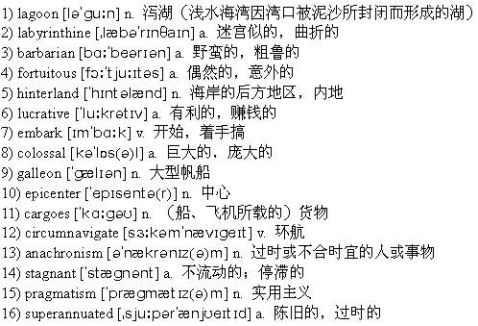
Saying Thanks To My Ghosts
向“鬼”致谢
By Amy Tan
I didn’t used to believe in ghosts, but I was trained to talk to them. My mother reminded me many times that I had the gift. It all 1)stemmed from a lie I told when I was four. The way my mother remembered it, I refused to get ready for bed one
night, claiming there was a ghost in the bathroom. She was delighted to learn I was a spirit medium. Thereafter, she questioned anything unusual: a sudden gust of wind,
a vase that fell and shattered. She would ask me, “She here?” She meant my grandmother.
When I was a child my mother told me that my grandmother died in great 2)agony after she accidentally ate too much opium. My mother was nine years old when she watched this happen. When I was 14, my older brother was 3)stricken with a brain tumor. My mother begged me to ask my grandmother to save him. When he died, she asked me to talk to him, as well. “I don’t know how,” I protested.
When my father died of a brain tumor six months after my brother, she made me use an 4)Ouija board. She wanted to know if they still loved her. I spelled out the answer I knew she wanted to hear, “Yes, always.”
When I became a fiction writer in my 30s, I wrote a story about a woman who killed herself eating too much opium. After my mother read a draft of that story, she had tears in her eyes. Now she had proof: my grandmother had talked to me and told me her true story. How else could I have known my grandmother had not died by accident, but with the fury of suicide? She asked me, “She here now?” I answered honestly, “I don’t know.”
Over the years I have included other details in my writing I could not possibly have known on my own: a place, a character, a song. I have come to feel differently about my ghostwriters. Sometimes their clues have come so plentifully they’ve
made me laugh like a child who can’t open birthday presents fast enough. I must say thanks, not to blind luck, but to my ghosts.
Ten years ago I clearly saw a ghost. And she talked to me. It was my mother. She had died just 24 hours before. Her face was ten times larger than life, in the form of a moving 5)pulsing 6)hologram of sparkling lights. My mother was laughing at my surprise. She drew closer. And when she reached me, I felt as if I had been physically punched in the chest. It took my breath away and filled me with
something absolute—love, but also joy and peace—and with that, understanding that love and joy and peace are all the same thing. Joy comes from love. Peace comes from love. “Now you know,” my mother said.
I believe in ghosts. Whenever I want, they will always be there: my mother, my grandmother, my ghosts.
过去,我并不相信“鬼”的存在,但我被训练成能与其交谈。我母亲多次提醒我:我有那种天赋。这一切全起因于我四岁时撒的一个谎。我母亲回忆道,一天晚上,我不愿意上床睡觉,声称浴室里有只鬼。得知我是个通灵者,她那时
很高兴。此后,任何不同寻常的事情发生,她都会疑神疑鬼——突然而至的一阵风,摔个粉碎的花瓶。她会问我:“她在这儿吗?”她指的是我外婆。
我还小的时候,母亲告诉我,我外婆是意外吃下太多鸦片后痛苦地死去的。目睹这一切发生时,我母亲只有九岁。我十四岁的时候,我哥哥患了脑瘤。母亲让我求外婆救救他。哥哥死后,她让我跟哥哥交谈。“我不知该怎么做,”我抗议道。
我父亲在我哥哥去世后六个月也因脑瘤去世了,母亲让我使用显灵板。她想知道他们是否依然爱她。我写出了她想听到的回答:“当然,永远爱你。” 在我三十多岁时,我开始写小说。我写了篇短篇小说,讲一个女人因进食过量鸦片而致死的故事。我母亲看了小说的草稿后,眼里泛起了泪花。现在,她有证据了:我外婆跟我有交流,给我讲过她的真实故事。不然我怎么知道外婆不是死于意外,而是满腔愤恨自杀而死的呢?她问我:“她现在在这儿吗?”我老实地回答说:“我不知道。”
过去这些年里,我在写作中加入了其他一些本来我自己不太可能会知道的某个故事细节:某个地点、某个人物、某首歌。我开始对我的“鬼作家”有了不同的感受。有的时候,它们提供的线索如此丰富,使得我像个迫不及待地打开生日礼物的孩子那般傻笑。我必须对我的那些“鬼”表示感谢,而非归功于走大运。 十年前,我清楚无误地看见了一只“鬼”,她还和我说话。那是我母亲。她一天前刚去世。她出现时,面孔比生前要大上十倍,就像是一幅在运动中闪闪发亮的动态全息图。对于我的惊讶,我母亲报以嘲笑。她靠近我,当她触碰到我
时,我感到像是被人往胸口打了一拳。我惊呆了,同时,使我全身心都感觉到爱,还有喜悦和平静——因此,我理解到爱、喜悦和平静是同样的东西。喜悦源自爱,平静源自爱。“现在,你明白了吧,”我母亲说道。
我相信“鬼”的存在。只要我需要,它们总会出现在我的身边:我母亲、我外婆,我的那些“鬼”。
翻译:
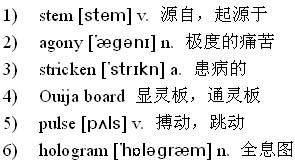
Portia
Night and Moonlight 月光之夜 (选段)
In the night the eyes are partly closed or retire into the head. Other senses take the lead. The walker is guided as well by the sense of smell. Every plant and field and forest emits its odor now, 32)swamp pink in the meadow and 33)tansy in the road. The senses both of hearing and smelling are more alert. We hear the 34)tinkling of 35)rills which we never detected before. From time to time, high up on the sides of hills, you pass through a 36)stratum of warm air. The stars are the jewels of the night, and perchance surpass anything which day has to show.
How insupportable would be the days, if the night with its dews and darkness did not come to restore the 37)drooping world. As 38)the shades begin to gather around us, our 39)primeval instincts are aroused, and we steal forth from our 40)lairs, like the inhabitants of the jungle, in search of those silent and 41)brooding thoughts which are the natural 42)prey of the intellect.
43)Richter says that “The earth is every day overspread with the veil of night for the same reason as the cages of birds are darkened, 44)viz: that we may the more readily 45)apprehend the higher harmonies of thought in the hush and quiet of darkness. Thoughts which day turns into smoke and mist, stand about us in the night as light and flames; even as the column which 46)fluctuates above the 47)crater of 48)Vesuvius, in the daytime appears a pillar of cloud, but by night a pillar of fire.”
深夜时分,视觉处于模糊或隐退的状态,其他的感官变为主导。散步者被嗅觉所引导,每棵植物、每片原野以及森林此刻散发出自己的香气,草地上弥漫着泽花的芳香,道路上满溢艾菊的芬芳。听觉和嗅觉都更加灵敏起来。我们从未像现在这般清晰地听到溪水流淌的清脆声音。当你沿山边小路走上山丘时,你会不时地感受到一团温暖空气的拥抱。星星是黑夜的珠宝,或许它们比白天里的任何事物都更胜一筹。 如果夜晚没有用它的露珠与黑暗来重振这颓丧的世界,那么日子将会是多么让人难以忍受啊!随着夜色开始萦绕身旁,我们原始的本能被唤醒,我们像丛林里的居住者一样从巢穴中悄悄溜出来,去探索那些鲜为人知的、深沉的思想,这些思想恰是智者的天然猎物。
里克特说:“地球每天都会披上黑夜的面纱,原因与鸟笼盖上帘布如出一辙,即:在黑暗的静谧中我们可能更容易理解更高层次的思想。思想在白天时变成烟和雾,在夜晚时却以光和火焰的形式出现在我们面前。思想甚至像维苏威火山口上方喷涌的柱状物,在白天,那是云柱,而在晚上,却是火柱。”
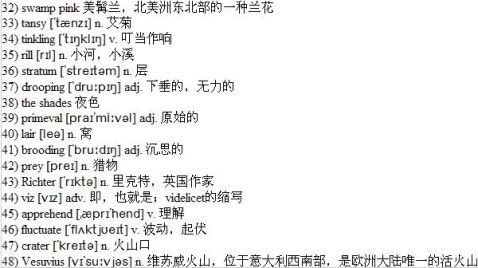
Why I’m Here
为爱停留
My mom has a 1)magnetic force around her. Rootless things fly through the air toward her and land at her feet. Five husbands did, one right after the other. She was 15 years old when Number One appeared. There’s only one photo of her from back then. She’s got one foot up on the 2)running board of an old 3)pickup truck. She’s got a hand up like she’s trying to shield her eyes. She looks like she’s seeing something off in the distance, something that’s better than anything within reach.
The day she met Arnie, Number One, was one of those days when you swear you can reach out and grab a handful of air, all hot and thick and going nowhere. Arnie’s car broke down on the road that ran alongside the 4)trailer park, just as Ma and her mom were coming back from the store, each carrying a bag of groceries. Arnie stood frowning into his engine, looked up as the women passed and asked the distance to the nearest gas station or garage. According to Ma, he got as far as “Hey ladies, can you tell me how far it is?” and Ma, full of too much humidity and boredom, shot back, “Too far for those 5)fancy shoes to carry you.”
Ma watched him pull his head back and start laughing. The car got fixed, and the next thing my grandma knew was that her daughter seemed to be
always getting into that car or getting out of it. Finally, my grandma signed the papers and Ma and Arnie were married. In four months, Arnie was in the 6)Merchant Marines, halfway around the world. Ma carried all his letters in her 7)bathrobe. She cried that she couldn’t hold onto the calls like she could the letters. After about a year, her bathrobe pockets went back to just 8)lint and tissues, and in no time at all, the divorce was finalized.
我的妈妈浑身上下都散发着磁力。空中的飞行物都会朝她飞来,落在她的脚边。就连她的五个丈夫也不例外,一个接一个地出现。遇见第一任丈夫时,她才15岁。她只有一张那时候的照片。照片中的她一只脚踩在一辆老旧小卡车的脚踏板上,举起一只手,试着护住眼睛,看起来就像她正在眺望着远处的什么,一些比眼前的任何事物都要美好的东西。
妈妈遇见第一任丈夫阿尼那天,就如那些闷热日子中的一天——你能发誓只要一伸手就能抓住一把空气,热辣辣的,厚重得根本不会从指间溜走。阿尼的车抛锚了,停在活动房屋停车场旁边的马路上,那时妈妈和她的妈妈刚好从商店回来,手里各提着一袋杂货。阿尼站在那儿,看着车子的引擎皱眉头,抬头之时看见母女俩经过,便询问到最近的加油站或者修车站的距离。据妈妈说,他当时就只说了一句:“女士们,你们好,请问你们能告诉我那个地方离这里多远吗?”而妈妈——早已汗热湿透也被闷坏了——丢回一句:“远到你那对漂亮鞋子走坏了都走不完。”
妈妈看着他把头缩了回去,笑了起来。车子修好了,而外婆知道的下一件事情便是她的女儿总是从那辆车子里进进出出。最后,外婆在文件上签了字,妈妈和阿尼便成了合法夫妻。四个月后,阿尼进入了商船队,踏上了环游世界的旅途。妈妈把他所有的来信都装在浴袍里。她哭着说自己没有办法留住他的来电,就像保存他的信件一样。大约一年之后,她浴袍上的口袋只剩下绒毛和纸屑而已,没过多久,离婚成了最终定局。

The Book Thief (Excerpt) 偷书贼(节选)
by Markus Zusak
(I)
【莉赛尔的养母罗莎·休伯曼为了贴补家用,要替镇上一些富裕人家洗烫衣物,其中就包括镇长家。这天,莉赛尔替养母去镇长家取脏衣服,遇到了手里抱着一大摞书的镇长夫人。在镇长夫人的示意下,莉赛尔走进了她的书房……】
Books everywhere! Each wall 1)was armed with overcrowded yet 2)immaculate shelving. It was barely possible to see the 3)paintwork. There were all different styles and sizes of 4)lettering on the 5)spines of the black, the red, the gray, the every-colored books. It was one of the most beautiful things Liesel Meminger had ever seen.
With wonder, she smiled. That such a room existed!
Even when she tried to wipe the smile away with her forearm, she realized instantly that it was a 6)pointless exercise. She could feel the eyes of the woman traveling her body, and when she looked at her, they had rested on her face. There was more silence than she ever thought possible. It extended like an elastic, dying to break. The girl broke it.
“Can I?” The two words stood among acres and acres of vacant, wooden-floored land. The books were miles away.
The woman nodded. Yes, you can.
Steadily, the room shrank, till the book thief could touch the shelves within a few small steps. She ran the back of her hand along the first shelf, listening to the 7)shuffle of her fingernails gliding across the 8)spinal cord of each book. It sounded like an instrument, or the notes of running feet. She used both
hands. She raced them. One shelf against the other. And she laughed. Her voice was 9)sprawled out, high in her throat, and when she eventually stopped and stood in the middle of the room, she spent many minutes looking from the shelves to her fingers and back again.
How many books had she touched? How many had she felt?
She walked over and did it again, this time much slower, with her hand facing forward, allowing the 10)dough of her palm to feel the small 11)hurdle of each book. It felt like magic, like beauty, as bright lines of light shone down from a 12)chandelier. Several times, she almost pulled a 13)title from its place but didn’t dare disturb them. They were too perfect.
(一)
到处都是书。每堵墙前面都摆着一尘不染的书架,书架上堆满了书,几乎都看不见墙上刷的漆了。书架上有黑色、红色、灰色等各种颜色的书,书脊上印着各式各样、大小不一的字母。这是莉赛尔·梅明格见过的最美丽的事物之一。
她出神地看着,笑了。原来还有这么一处好地方!
她试图用前臂遮住脸上流露出的一丝微笑,不过,她立刻意识到这个举动毫无意义。她能感觉到那个女人的目光在自己身上游走,等到她望着那个女人时,女人把目光集中到了她的脸上。沉默比她想象的还长,就像一根被拉长的橡皮带,快要被扯断了。女孩打破了沉默。
“我能不能……?”这几个词在空荡荡的、铺着木地板的空间里回荡。那些书好像远在数里之外。
女人点点头。可以,没问题。
这间屋子慢慢地缩小了,那些书架变得离偷书贼仅几步之遥,触手可及。她用手背触碰着第一个书架,聆听着指甲划过每本书的书脊的声音。它听起来就像一件乐器在演奏,或是一阵奔跑的脚步声。她的另一只手也加入其中,在书架上游走,一个接着一个。她高声地笑了起来,笑声蔓延开去。最后,她停下来,站在屋子中央,一会儿看看书架,一会儿又瞧瞧自己的手指。
她触摸到了多少本书呢?她感受到了多少本书呢?
她走了过去,重复着刚才的举动,这一次要更慢一些,而且她把手向前伸,用手掌心感受着书与书之间那些小小沟壑的起伏,伴随着一盏枝形吊灯上洒下的点点光芒,那种感觉让人觉得不可思议,美丽至极。有几次,她差点就抽出了其中一本书,可她还是不敢打扰它们。它们真是太完美了。
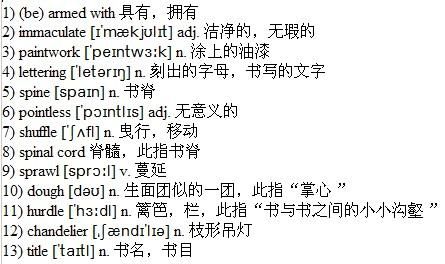
-
中考英语作文范文大全
20xx中考英语作文预测一健康问题热点1健康问题是中考常考的话题出题形式多样有必要下苦功掌握Howtokeephealthyfit…
-
初中英语写作范文集锦
初中英语写作范文集锦一围绕学校让学生打扫厕所和学校不让学生打扫厕所两种情况写一不少于80个词的主题为孩子的独立教育英语作文给出词o…
-
中考英语作文范文
中考英语作文范文一暑期计划ThesummerholidayiscomingImgoingtohaveagoodrestandlea…
-
20xx中考英语作文范文
20xx一摸英语作文预测一健康问题热点1健康问题是中考常考的话题出题形式多样有必要下苦功掌握Howtokeephealthyfit…
-
中考英语作文模板范例
中考作文模板范例学习英语HowtostudyEnglishTherearefourkeypointstostudyEnglishl…
-
英语美文摘抄
1Manypeoplebelievethattheywillbehappyoncetheyarriveatsomespecificgoaltheyse…
-
初中英语作文佳句摘抄
1wemustnotonlyhaveawiderangeofknowledgebutalsohavecomprehensivesk…
-
英语美文(摘抄1)
英语美文摘抄Allthatisbeautifulpoemsandpassagesoflifethingsdonotchangewe…
-
初中英语美文欣赏
ASimpleGesture只是举手之劳Markwaswalkinghomefromschoolonedaywhenhenotic…
-
初中英语美文欣赏
Don39tjudgealifebyonedifficultseason不要用一段艰难的时光来判定人生Therewasamanwh…
-
美文摘抄
1银白的月光洒在地上到处都有蟋蟀的凄切的叫声夜的香气弥漫在空中织成了一个柔软的网把所有的景物都罩在里面眼睛所接触到的都是罩上这个柔…